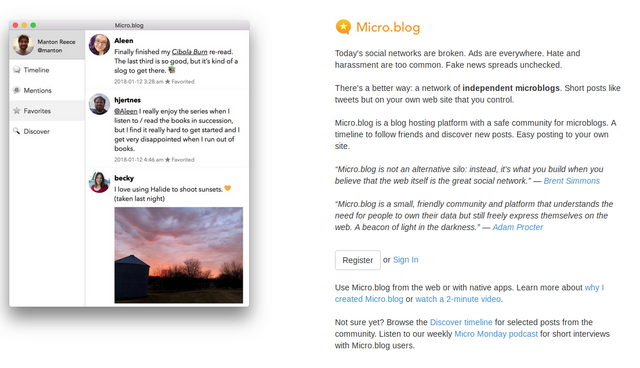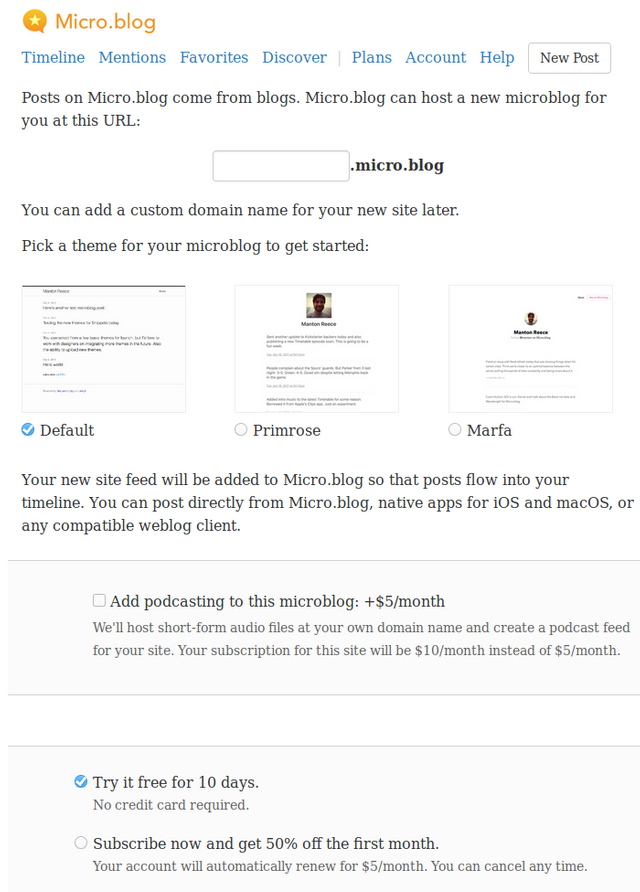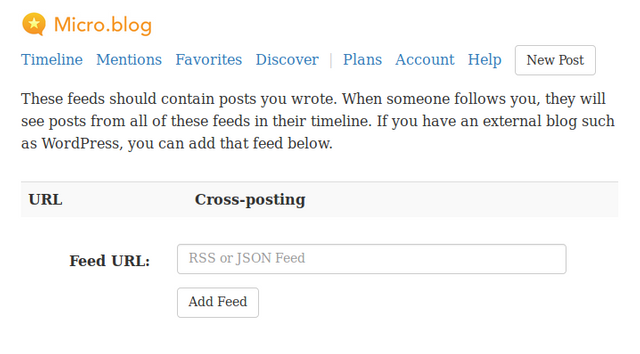Micro.blog - Using RSS feeds of blogs to create a decentralized Twitter clone
Micro.blog is a fairly new service, it launched in April 2017 so is only a year and a half old, I just heard about it on Hacker News. Micro.blog does something very intriguing, it creates a decentralized, ad free, "own your own data" social network as so many projects right now are trying to do, but it is based on old technology used in new ways.
Micro.blog works like Twitter, but instead of all your data being stored on Micro.blog, you add your own already existing blog (for example a Wordpress blog) via your blog's RSS feed and then other people can follow your blog on Micro.blog, like your posts, comment on them and so on. I find the idea really interesting, but there is a caveat here, it is not complete decentralization, you do need to create an account on Micro.blog (free) and add your blog's RSS feed to this central place, so you are still at the whims of a central authority that controls everything, it's just that if they throw you out or shut their site down, your data will all still be available on your own blog as it always was.
This central element gives your blog discoverability, which is always an issue in fully decentralized systems. ZeroMe for example from the decentralized network ZeroNet uses so called hubs, central authorities you create your profile on and when users subscribe to that hub they can find you. Secure Scuttlebutt does something very similar (although technically very different), but it calls it pubs and not hubs. Everyone can make a hub or a pub, and then people can find you through following that hub or pub. Not a perfect solution, but it works.
On Micro.blog, a single human community manager is responsible for checking out new people who signed up and featuring their posts in the site's "discovery" section so that other users can find them. So in its current form this is not something that will scale, this is certainly not the future of the internet, but it's still a really cool idea and project. I like it when existing technologies like RSS are used in new ways to create something completely different that I didn't think of before.
Microblogs are called Micro because you have a character limit, so Micro.blog has one too, it's 280 characters, double the amount of the original Twitter character limit. You can however go over the limit if you have to and if you want to write a really long blog post, it just gets imported with the title as the microblog post. That's what happens when you import your existing blog into Micro.blog, depending on the type of your posts, they will show up either as just a title and link in Micro.blog, or as a full post (when it's shorter and of type status).
Your posts can also have categories and of course here Micro.blog does something neat as well, the categories are emoji. If you want to write about books, you just use a 📚 emoji in your post, for movies the 🍿 emoji, you get the idea :)
If you don't already have a blog you can use, you can pay Micro.blog to host a blog for you, that costs $5 per month, then you also get the ability to cross-post to different services like Twitter. If you use our own blog with Micro.blog you can buy that particular feature for $2 per month. There is also a $10 option which adds a podcast feature.
Micro.blog also offers a macOS and iOS app. No Android, but third parties can develop clients and it uses standard protocols so a lot of blogging tools already work with Micro.blog out of the box. The focus on Apple is no coincidence, the creator of Micro.blog, Manton Reece, does a macOS and iOS development podcast called Core Intuition.
Another thing to note is that Micro.blog started as a Kickstarter project for both the platform and a book about Microblogging that was funded in a single day, the target was only $10k, but it's still quite an achievement and the funding more than doubled on the third day of the Kickstarter. It ended with a sum of $86,696 of funding and over 3000 backers.
When you just signed up for Micro.blog you are presented with this view, where you can make a new blog hosted by Micro.blog with a free 10 day trial:
If you don't want to pay and use your existing blog instead, just click on Account in the menu, Edit Feeds & Cross posting, and then you can enter your blog's RSS feed URL:
Sadly I noticed that I don't actually have any of my posts in RSS feed form. Steem doesn't offer RSS feeds, there was a service that created RSS feeds from Steem but that doesn't exist anymore. Maybe I'll just write my own tool for that :) It's great that you can add more than one feed to Micro.blog, I wouldn't want to start writing microblogs on Steem, so I could just write those somewhere else but import my stuff from both Steem and other places.



Oh man I actually had this same idea independently! I have the sketches to prove it. Interesting idea right?
I would contribute to that, start it up!
Haha, I believe you :) It's like what ZeroNet did, combined Bittorrent with Bitcoin cryptography and created decentralized websites with it which was never the intended use, but since existing technologies were used this was all done by just one guy whereas other projects like IPFS need huge teams. Or Beaker Browser which took the Dat protocol which is very similar to Bittorrent (basically Bittorrent 2.0) but added websites on top of that to create decentralized websites, and was mainly created by two people (now there are three core team members I believe). It's really cool when existing technologies are mixed like that to create something new. And it seems so obvious to do that in hindsight, but it tends to be much harder to actually come up with that idea, and then to actually implement and publish it :)
I'd just write a quick command line RSS feed tool for myself, not something that is hosted so that it's easily usable. I haven't done server side things in years. But the command line tool I might write could in theory be used by someone else to create an easy to use website to offer this as a service for Steem, I'd write it in Node.js anyhow so the code could be used on the server too, there is a nice RSS feed library so hacking something up shouldn't take many lines of code. I might do that on the weekend if I find the time :)
I've been writing a little tool to copy all my Steem posts to Beaker as a decentralized website, I noticed some of the images of my older Steem posts went missing so I wanted a more permanent backup. The tool downloads all the pictures together with the articles and saves them as Markdown files, Beaker automatically creates a website from Markdown files that you can style with CSS:
That's written in a mix of Node.js and Red right now which is why I haven't published it yet, should all be written in just one language, but I can probably copy some Node.js code from that for the RSS feed tool :)
@crypticwyrm, Please consider contributing PR’s to SteemRSS on GitHub instead of reinventing the wheel. It runs on Node.js. http://www.steemRSS.com. Also let me know if you have feedback, or feel free to create issues directly on GitHub.
You can try http://www.steemRSS.com. Let me know if you have feedback.
Tech and Fintech Blog